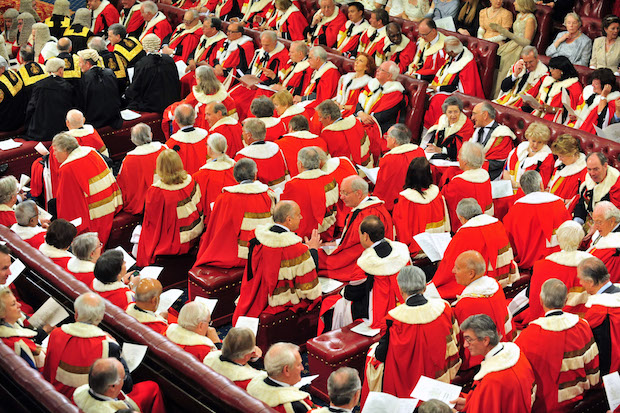The House of Lords is set to vote on several measures relating to the tax credits reforms today and Westminster is on tenterhooks to see if they have the nerve to kill off the cuts. Matthew Hancock, the Cabinet Office minister and close college of George Osborne, said on the Today programme the government is listening to the concern in the Lords — echoing the words of Nicky Morgan yesterday:
‘George is very much in listening mode and the peers this afternoon have the opportunity through a motion put down the Bishop of Portsmouth to express regret at this measures without braking this constitutional convention, long standing.’
Hancock reiterated his admiration for the Lords’ work to ‘improve’ and ‘suggest’ bills but denied these cuts will make people worse off — pointing to the ‘whole package’ of reforms including the National Living Wage, the rise in the income tax threshold and the extra childcare:
‘By next year, 8 out of 10 people will be better off as a result. But we’re trying to make a bigger change in this country. We’re trying to change Britain from a country that lives beyond its means to one that lives within its means — and also from one where we have relatively low wage and high taxes and then high benefits, where we recycle money in taxes, take it away in taxes and give it back in benefits, to one where we have higher pay and lower benefits and lower taxes too.’
That grand vision of a higher pay, lower benefits and lower tax economy is Osborne’s vision to reshape the British economy over the next five years. It’s ambitious but with a Tory majority, it’s one the government reckons it can see through. Opponents to the changes say there is no mandate for these tax credit cuts. Hancock naturally disagrees that the government did not consult about the changes in May’s general election :
‘We did – we set out that we would seek £12 billion of welfare savings. This is just over £4 billion of it. There is a more important point than that which is for the debate in the House of Lords: more important than whether it was in the manifesto, although that is very important and it was, more important than that is that the House of Commons has debate this three times. In the debate on the House of Commons on this, the statutory instrument was passed with a majority of 35 – much bigger than our government majority.’
What is notable here is the combination of humility and determination from Hancock. He reiterated the phrase ‘listening mode’ several times — an attempt to show that the Tories acknowledge the fears in Parliament about the changes — while warning about an ‘unprecedented constitutional path’. The last thing the government wants after the tax credits row is a debate about the role of the House of Lords. If Hancock is Osborne’s mouthpiece, then it seems the Chancellor has a simple message for peers today: please don’t do this, we will fight you.






Comments